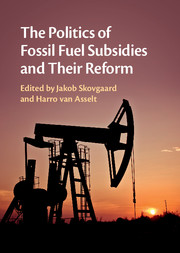Fossil fuel subsidies, as well as efforts to reform them, have entered the mainstream political and societal debate following the G20 commitment to rationalise and phase out fossil fuel subsidies in 2009. Owing to the efforts of a range of intergovernmental and non-governmental organisations, including the Organisation for Economic Co-operation and Development, the International Energy Agency, the International Monetary Fund, the World Bank, the Global Subsidies Initiative, Oil Change International and the Overseas Development Institute, to name but a few, we now know much more about their size (which is by any measure very substantial), their use in practice in both developed and developing countries and their socio-economic and environmental effects. Likewise, our understanding of efforts to reform fossil fuel subsidies has increased significantly, with practical experiences pointing to lessons to emulate – or avoid.
Yet, while interest in the subject from policymakers and practitioners is clearly increasing, academic engagement is still in its infancy. For instance, as a crude indication, a search at the time of writing (September 2017) for ‘energy subsidies’, ‘energy subsidy’, ‘fossil fuel subsidies’ or ‘fossil fuel subsidy’ (and excluding ‘renewable’ energy subsidies) in the Web of Science yields only 55 academic articles, 43 of which were published after the G20 announcement. Moreover, many such studies to date are carried out by economists, with a view to modelling the economic and environmental impacts of fossil fuel subsidies (or of their reform). While we believe that such research remains crucial for furthering our understanding of the scope of the problem and the need for reform, we also believe that the political dimensions of fossil fuel subsidies and their reform have received insufficient scrutiny in the academic literature. Studying the political causes, consequences and normative implications of fossil fuel subsidies and their reform is indispensable for understanding why subsidies were created in the first place, why they persist and why it can be so difficult to reform them. Such analyses, in our view, can draw on decades of theoretical and empirical work in political science and related social sciences that sheds light on international institutions and their influence on the domestic level, as well as political economy and policy change, output and processes. Through this book, we therefore hope not only to strengthen the body of knowledge on fossil fuel subsidies and their reform but also to bring together the empirical knowledge accumulated in the past years and longer-standing theoretical debates in political science and other social sciences.
Bridging the policy-oriented and academic communities was also a goal of the workshop that laid the foundation for this book. The workshop, held in Stockholm in June 2016, brought together seasoned experts on fossil fuel subsidies, representatives from non-governmental organisations, doctoral students and established scholars. The exchange of views, findings and experiences was extremely stimulating and showed that there is still much to learn from each other. We are thankful to all participants at the workshop for an inspiring discussion. To us, this book is the logical next step, and we hope that it offers a solid foundation for future exchanges and collaborations among scholars, students and practitioners as well as for future research.
The sum of an edited volume is only as good as its constituent parts, and we have been privileged to work with an excellent group of authors representing the various above-mentioned communities. We thank the authors for their patience, for their prompt responses to our seemingly never-ending queries and comments and, of course, for their valuable contributions.
This book would not have been possible without the helpful input from a wide range of reviewers. We want to express our thanks to the reviewers at Cambridge University Press, as well as the following people, who have dedicated their time to provide valuable feedback on the individual chapters of this book: Stefan Andreasson, Lucy Baker, Hernan Carlino, Sergio Chaparro, David Coady, Peter Erickson, Robert Falkner, Ivetta Gerasimchuk, Fergus Green, Thomas Hale, Florian Kitt, Caroline Kuzemko, Michael Lazarus, Paasha Mahdavi, Steffen Hertog, Kati Kulovesi, Indra Øverland, Guillermo Perry, Jun Rentschler, Michael Ross, Hannes Stephan, Lasse Toft Christensen, Thijs Van de Graaf, Vangelis Vitalis, Oscar Widerberg, Peter Wooders, Margaret Young and Fariborz Zelli.
Emily Yehle at the Stockholm Environment Institute’s US office helped us through superb copy editing. Finally, we thank the team at Cambridge University Press, in particular Matt Lloyd and Zoë Pruce, who have been supportive of this book project from the very beginning.
Throughout the development of this book, we have been supported financially through grants from the Swedish Research Council (Formas) for two different projects: ‘International Economic Institutions and Domestic Actors in the Climate Regime Complex – The Cases of Climate Financing and Fossil Fuel Subsidies’ and ‘From Emissions to Extraction: The Political Economy and Governance of Leaving Fossil Fuels in the Ground’. The former project also funded the workshop in Stockholm, and both projects have enabled us to publish this book on an Open Access basis. Harro van Asselt has further been supported through the Stockholm Environment Institute’s Initiative on Fossil Fuels and Climate Change (funded by the Swedish International Development Agency) as well as through the University of Eastern Finland.
Last but not least, we are grateful to our loving and supportive families for their patience and encouragement throughout the process of writing and editing this book.



